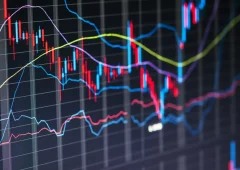South Korea’s Central Bank Rejects Bitcoin as a Reserve Asset
17.03.2025 13:08 1 min. read Alexander Stefanov
South Korea’s central bank has ruled out adding Bitcoin to its national reserves, citing its extreme volatility as a key concern, according to a report by Korea Economic TV.
The decision comes amid discussions within the country’s political landscape. Some industry figures have urged the Democratic Party of Korea to address the U.S. government’s recent move to establish a Bitcoin reserve, which includes confiscated cryptocurrency holdings.
The U.S. has also built up reserves of other digital assets, prompting questions about whether South Korea should follow suit.
A Democratic Party member formally inquired about the Bank of Korea’s position on Bitcoin reserves, but the central bank dismissed the idea, reaffirming its traditional approach to reserve management.
South Korea currently holds around $410 billion in foreign exchange reserves, making it the world’s 12th-largest economy.
Globally, central banks have largely remained skeptical of Bitcoin as a reserve asset. Earlier this year, European Central Bank President Christine Lagarde stated that the ECB and other members of the General Council had no intention of holding Bitcoin.
This response followed a proposal by the governor of the Czech National Bank, Ales Michl, who suggested investing billions in Bitcoin as a diversification strategy.
-
1
Bitcoin Nears Key Support Levels Amid Growing Market Uncertainty
10.06.2025 18:00 1 min. read -
2
Strategy’s Michael Saylor Says Bitcoin’s Volatility Era Is Over
13.06.2025 8:00 1 min. read -
3
Quantum Computing Won’t Kill Bitcoin, Says Michael Saylor
10.06.2025 12:00 1 min. read -
4
Bitcoin on the Edge: Why One Veteran Trader Sees a 75% Plunge
11.06.2025 13:00 1 min. read -
5
Bitcoin Struggles as Selling Pressure Mounts Amid Geopolitical Turmoil
13.06.2025 15:00 2 min. read
Strategy Boosts Bitcoin Holdings to 597,325 BTC with Latest Purchase
Bitcoin giant Strategy has added another 4,980 BTC to its reserves in a purchase worth approximately $531.9 million, according to Executive Chairman Michael Saylor.
Veteran Trader Peter Brandt Shares Simple Wealth Strategy with Bitcoin at Its Core
According to renowned market veteran Peter Brandt, trading isn’t the path to prosperity for the vast majority of people.
Why Bitcoin Is Stuck Despite Wall Street Demand
Charles Edwards, founder and CEO of Capriole Investments, has offered a fresh perspective on Bitcoin’s stalled price movement near the $100,000 mark, despite growing institutional enthusiasm.
Metaplanet Now Holds 13,350 BTC Worth $1.4 Billion
Metaplanet has expanded its Bitcoin treasury with a new acquisition of 1,005 BTC valued at approximately $108.1 million, further cementing its status as one of the largest corporate holders of the digital asset.
-
1
Bitcoin Nears Key Support Levels Amid Growing Market Uncertainty
10.06.2025 18:00 1 min. read -
2
Strategy’s Michael Saylor Says Bitcoin’s Volatility Era Is Over
13.06.2025 8:00 1 min. read -
3
Quantum Computing Won’t Kill Bitcoin, Says Michael Saylor
10.06.2025 12:00 1 min. read -
4
Bitcoin on the Edge: Why One Veteran Trader Sees a 75% Plunge
11.06.2025 13:00 1 min. read -
5
Bitcoin Struggles as Selling Pressure Mounts Amid Geopolitical Turmoil
13.06.2025 15:00 2 min. read


